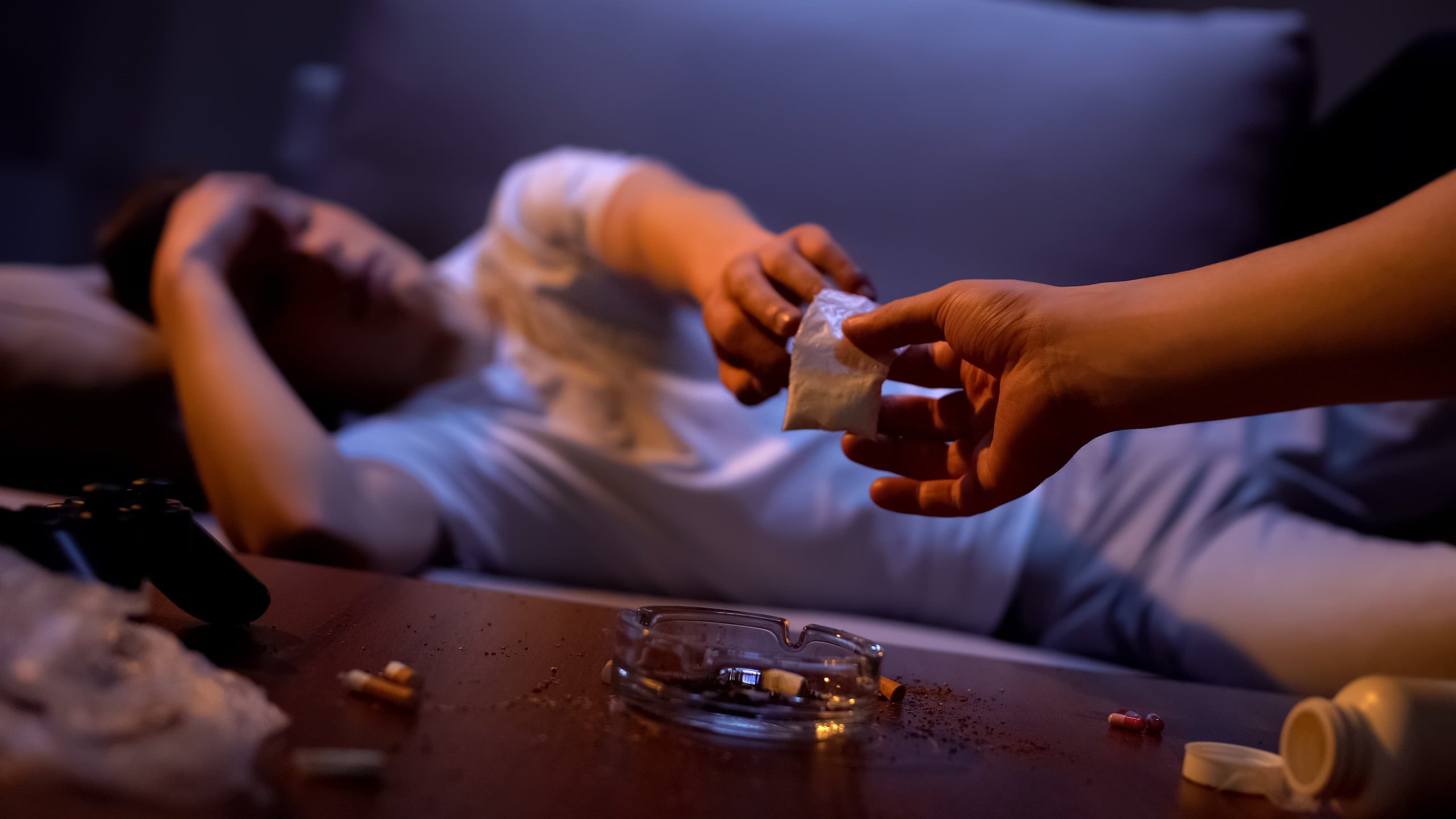The Joint Commission is the governing body that reviews and accredits U.S. health care organizations and programs. Ensure the facility selected has this accreditation.
Substance Abuse Rehab & Treatment
At Beachway Therapy Center, we understand substance abuse recovery is a deeply personal journey. Our dedicated team provides customized treatment plans to address each patient’s unique needs. We offer a holistic approach to recovery that combines evidence-based therapies with compassionate support. Our goal is to empower patients to reclaim their lives in a safe, supportive, and serene environment.
We provide residential inpatient and outpatient rehab options depending on individual needs and circumstances. A steady transition through detox, inpatient care, outpatient care, and aftercare gives patients continuous support through every stage of recovery.

Dual Diagnosis - Mental Health and Substance Use Disorder
Beachway Therapy Center specializes in dual diagnosis treatment, addressing substance abuse and co-occurring mental health disorders. Our comprehensive approach integrates evidence-based therapies tailored to each individual’s needs, ensuring both conditions are treated simultaneously for optimal recovery.
With a team of experienced professionals and a supportive environment, we provide personalized care that helps individuals achieve lasting recovery and improved mental health. Whether patients struggle with depression, anxiety, or another mental health issue alongside addiction, Beachway is here to support each person’s journey to wellness.


What is Addiction
and How Does it Begin?
Drug addiction, sometimes referred to as substance use disorder, is defined by the Mayo Clinic as a disease that impacts an individual’s brain and behaviors and eventually causes a loss of control over drug, alcohol, or medication use. Addiction can start with experimental use or a borrowed prescription drug from a friend, for example. The risk of a full-blown addiction depends on the substance, as some drugs, including opioids and cocaine, are more addictive than others.
As a person continues to use drugs, they need more of the substance to get the same high, and it becomes increasingly difficult to function without a fix. Without the drug, the user feels symptoms of withdrawal. This vicious cycle sets the stage for long-term substance abuse and dependence that can potentially destroy the lives of the drug user and their loved ones.
Commonly Abused Substances
We understand every individual’s experience of addiction is different. Although detox processes may differ depending on the addiction, post-detox treatment is similar, regardless of the substance used. For that reason, our individual and group therapy sessions focus on addiction recovery rather than a single substance.
Alcohol abuse can disrupt lives, impacting health, relationships, and employment. Effective treatment involves personalized detox, therapy, and strategies for sustainable recovery, addressing the addiction and its root causes to promote lasting sobriety.
Cocaine addiction leads to severe physical and psychological consequences, damaging a person's personal and professional life. Recovery involves specialized detox, counseling, and relapse prevention strategies tailored to each individual, focusing on breaking the cycle of addiction and laying the foundation for long-lasting rehabilitation.
Methamphetamine addiction, marked by rapid dependency and severe health deterioration, demands a comprehensive treatment strategy. Recovery focuses on medical detox to address physical withdrawal, coupled with intensive behavioral therapy to confront addiction's psychological aspects, paving the way for a sustained meth-free lifestyle through continuous support and rehabilitation efforts.
Prescription drug addiction, often starting as legitimate medication use, can evolve into a life-consuming dependency with profound health, emotional, and social impacts. Recovery combines targeted detoxification to ease withdrawal, personalized therapy to address the underlying issues and patterns of abuse, and aftercare programs to support lasting wellness.
Opioid addiction devastates health, disrupts lives, and has a high overdose risk. Effective treatment involves supervised detox, personalized therapy to tackle the addiction's roots, and extensive aftercare.
Types of Therapies and Approaches in Substance Abuse Treatment Centers
Substance abuse rehab requires patients to lay a solid foundation for lifelong recovery. Therapies we offer include:
-
- Evidence-based therapies: Cognitive behavioral therapy empowers patients to identify and dismantle unhelpful thinking patterns that lead to challenging behaviors. Solutions-focused brief therapy highlights the individual's strengths and helps them make and celebrate small, achievable steps toward recovery for long-term results.
- Holistic therapies: Beachway integrates holistic treatments that address the body, mind, and spirit to help patients process their emotions and find healthy outlets for stress. Each music, art, and recreational therapy session helps patients restore balance and rest after engaging with the more challenging aspects of recovery.
Group, individual, and family substance abuse therapy forms part of Beachway’s comprehensive care plan.
Family Involvement in Substance Abuse Treatment
Family involvement can be transformative for people in recovery, but their level of engagement depends on their individual needs and circumstances. Families have the option to be actively involved in the process, but in some cases, experts recommend stepping back. Sometimes, the patient may benefit from having space to heal.

What Is Residential Treatment?
Residential treatment allows patients to focus solely on recovery. Because inpatient treatment is residential, patients are removed from the temptations and stressful events they would normally experience in their everyday lives.
A comprehensive, all-inclusive drug treatment program provides a safe, supportive environment with evidence-based therapies, typically lasting between 30 and 90 days. Inpatient treatment also provides the medical and psychiatric care necessary to address other factors that can accompany drug addiction:
- Co-occurring mental health disorders
- Physical health needs
- Struggling family members
- Case management
- Long-term aftercare planning
Because of the supportive environment and separation from relapse triggers and temptation, inpatient drug treatment centers are generally the most effective treatment for substance abuse and drug addiction, but they require full commitment. Entering an inpatient drug rehab facility means time away from family, work, school, and friends.
Patients accustomed to being in control of their environments may have difficulties adjusting to a set schedule where activities are controlled and restricted. However, having the experience and wisdom of medical experts and professionals in this crucial time is helpful and can lead to lifelong recovery.
At Beachway, our inpatient treatment program includes:
-
- Food and housing
- All amenities
- Intensive individual, group, and family therapy
- Medical supervision
- Holistic treatments


What Is Aftercare Drug
Rehab?
Leaving an inpatient rehabilitation center presents all sorts of challenges for patients. After returning to their independent lives, it can be beneficial if they retain the support of their rehab specialists. Long-term recovery depends on ongoing aftercare treatment programs.
Once a patient finishes their initial detoxification or hospitalization program, a medical professional from the addiction recovery center works with them to determine the next steps. Our aftercare treatment features an intensive outpatient treatment program, which may include individual, group, and/or family therapy sessions.


How to Pay for
Substance Abuse Rehab Center Costs
Most health insurance plans cover the cost of drug rehab treatment. Patients may qualify for short-term disability coverage if they have a private health insurance policy or one obtained through an employer. Family medical leave (FMLA) may also be an option, as it secures employment until treatment finishes and offers financing options.
Inpatient treatment is a financial commitment and is typically more costly than outpatient drug addiction rehabilitation. Insurance may cover much of the cost, but patients may encounter additional expenses and loss of income during treatment. In some cases, drug and alcohol rehab financing may be available.
Patients should carefully consider the financial implications and make informed, responsible decisions. Health isn’t something to gamble with, so although treatment can be expensive, it should be viewed as a critical, long-term investment in a drug- and alcohol-free future.

How to Find the Right Treatment Facility
Since addiction is so widespread, substance users have no shortage of drug rehab facilities to choose from. Finding a reputable treatment center is pivotal for long-term recovery. Those struggling with addiction deserve the best drug rehab programs possible to ensure a full recovery.
Ask the questions below to identify the best treatment center.
Is the facility accredited by The Joint Commission?
Does the drug treatment program have any other accreditations or certifications? How long have they been in business?
A new facility may sound great on paper, but it must be experienced and established in the field. The facility should have licensed, credentialed therapists and expert medical professionals on staff.
Are programs specific to each patient's needs?
Each patient has unique needs, so therapists must personalize every treatment plan.
What is the environment like?
Treatment should take place in homelike environments as opposed to institutional settings. They should also offer welcoming amenities that make their center a prime option for treatment.
What are the payment options?
Look into which health insurance plans the treatment center accepts and identify any financial requirements or out-of-pocket expenses.
Some drug rehab centers offer "sober living" or transitional housing, but patients have to pay for it separately. Some programs suggest they'll pay for housing if patients sign up for their intensive outpatient treatment program insurance. This may be an illegal offer by a less-than-reputable drug rehab facility that won't help with recovery and could make matters worse.




Why Choose Beachway?
Beachway Therapy Center is a family-owned South Florida drug rehab facility dedicated to providing the best rehabilitation services in a luxurious and healing environment. We employ trained therapists offering innovative, compassionate, and comprehensive care.
Our high standards and years of experience in South Florida have helped us earn accreditation from The Joint Commission — the gold standard in national accreditation for treatment facilities. Beachway is regulated by the Department of Children and Families in Florida, and we continuously exceed state standards.
Unique Aspects of Beachway's Substance Abuse Treatment
Beachway focuses on quality patient care, an ongoing commitment to staff training and education, and our luxurious, homelike beachfront setting.



